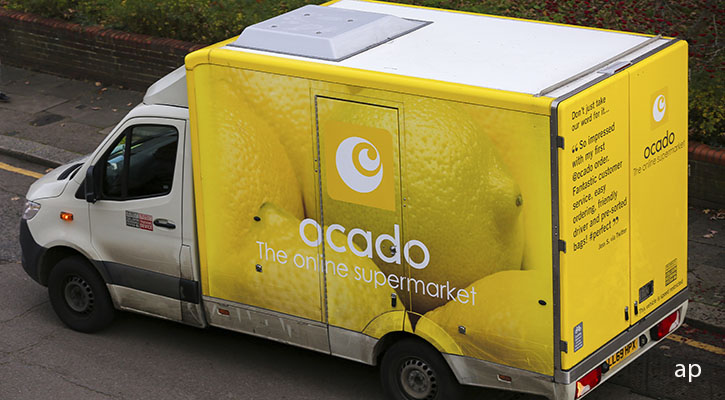
UK investors often describe the FTSE 100 as a collection of "old economy" stocks, which face heavy scrutiny over environmental, social, and governance concerns. But is the London Stock Exchange inherently high risk from an ESG perspective and how does it compare to rival markets?
How Risky Are UK Stocks?
Morningstar Sustainalytics' company-level ESG Risk Score measures the extent to which a company's economic value is put at risk by relevant ESG factors.
The ESG Risk Score looks at a company's exposure to specific material risks and it evaluates how well it is managing those risks.
When looking at the iShares Core FTSE 100 ETF (ISF), a proxy for the FTSE 100, according to Sustainalytics data, the corporate percent of the portfolio covered by a negligible, low, medium, high or severe ESG Risk score was 4.39%, 31.73%, 41%, 22.88% and 0% respectively. So more than half of the index has an ESG risk of medium and above.
And out of the top 10 companies by market capitalisation in the Morningstar UK index, four out of the 10 leaders have a high ESG risk rating.
Glencore (GLEN), one of the world’s largest commodity traders in markets for metals and minerals, led the pack with a score of 37.
The company is followed by BP (BP), Shell (SHEL) and Rio Tinto (RIO), which reported a high ESG risk of 33.8, 32.4, and 32.3 respectively.
Why Are These Stocks Controversial?
Glencore is allotted a severe controversy rating by Sustainalytics, with its top ESG issues being bribery and corruption, community relations, emissions, effluents and waste, as well as occupational health and safety.
Of late it has come under scrutiny for recording a huge increase in carbon emissions last year, despite its low emissions targets.
Its emissions rose 8.8% in 2023 to 432.8 million tonnes of carbon dioxide after it expanded coal production and reopened an oil refinery in South Africa.
Although BP and Shell have similar ESG risk scores, the oil and gas conglomerates diverge on their controversy rating.
BP finds itself with a "significant" controversy rating whilst Shell is seen as more problematic with a high controversy rating.
Although the two oil and gas majors share ESG issues ranging from emissions to occupational health and safety, bribery and corruption is a theme that blemishes BP’s record whilst one of Shell’s top ESG issues is community relations.
In 2019, BP was found to have promised around $10 billion (£7.82 billion) to a businessman in Senegal in exchange for access to the country’s coastal natural gas fields.
Meanwhile, Shell is currently facing litigation over its handling of chronic oil pollution in the Niger Delta which Nigerian villagers claim has destroyed their way of life.
Community relations, emissions, effluents and waste, resource use, and carbon are the top ESG red flags for mining giant Rio Tinto.
The business also has a high controversy rating, with it facing litigation from neighbouring villagers to one of its mines in Madagascar, for contaminating the waterways and lakes that they use for domestic purposes.
Are US and European Stocks Lower Risk?
In comparison to the S&P 500, the Nikkei, and the Euro Stoxx 50, the FTSE 100 is the index has more companies with a high ESG risk rating.
On the S&P 500 Meta Platforms (META) is the only stock out of the top 10 by market capitalisation to have a high ESG risk, whilst Mitsubishi (MBI) has taken that crown for Japan's Nikkei.
Euro Stoxx 50 is also the outlier as none of the top 10 largest stocks by market capitalisation in Europe have been branded as having a high ESG risk by Sustainalytics.
In terms of medium ESG risk, the cohort is larger.
On the S&P 500, Alphabet Inc (GOOGL), Amazon.com (AMZN), Berkshire Hathway (BRK.A), and Eli Lilly (LLY) have all received medium ESG risk classifications.
On the Nikkei, Toyota Motor (TYT), Mitsubishi UFJ Financial (MUFG), Hitachi (HTHIY), SoftBank (SFBQF) and Sumitomo Mitsui Financial (XMF) were given medium ESG risk ratings.
Whilst low and negligible ESG risk ratings dominated the top 10 stocks in the Euro Stoxx 50, with LVMH (LVMHF), L’Oreal (OR), Hermes (RMS), SAP SE (SAP), and Industria de Diseño Textil (ITX) classified as low risk.
Meanwhile, ASML and Schneider Electric (SU) were deemed to have negligible ESG risk ratings.
What do UK Equity Fund Managers Think?
For Laura Foll, portfolio manager of the Janus Henderson UK Equity Income & Growth Fund, there are nuanced reasons for why UK equity fund managers hold certain companies despite their questionable ESG credentials.
"So, you get to a Ukraine year where suddenly the fossil fuel price spikes beyond what anyone thought would have happened. Industrial companies had a tough time because they are using a lot of fossil fuels.
"Their input costs suddenly jumped unexpectedly. You must have something elsewhere in the portfolio that can shoulder some of that and do better in those types of times," she told Morningstar UK in a recent studio interview.
Foll also argues that it was the right thing for her fund to include some exposure to fossil fuel companies, because despite the desire to move away from them, many industries are still unprepared for that transition.
Do Governance Scores Tell a More Nuanced Story?
According to Sustainalytics, when analysing the iShares Core FTSE 100 ETF, the data highlights a reasonably low portfolio governance risk score of 6.66.
Company governance risk scores from Sustainalytics measure the degree to which a economic value may be at risk to governance factors. The Governance Risk scores range between 0 and 100, although most of the scores range between 0 to 25.
Glencore is the holding with the highest governance risk score of 11.07. BP, Rio Tinto and Shell, which all have high ESG risk scores, have much lower governance risk scores of 7.39, 5.72 and 5.70 respectively.
How Can Investors Use ESG Data?
ESG investing allows investors to exclude certain companies from their portfolios if they do not meet the right environmental, social or governance criteria. ESG is also often confused with impact investing, which allows investors to back businesses that are designed to address a specific issue or to offset their impact on the environment or society at large.
However, what is clear is that ESG data provided by services like Sustainalytics allow institutional and retail investors to have more transparency in their investment choices. It gives people the autonomy to put their money with their mouth is. If you are solely focused on returns you can invest in whatever company or fund you like.
However, with ESG data allows you can choose to invest in companies which share your values, and which will boost your investment pots if they achieve a positive return rate.
Top ESG Funds for UK Investors
ESG funds have suffered outflows in recent years. Many ESG projects have struggled to sustain returns in a high interest rate and inflation era, and investor sentiment has weakened due to poor performance since 2020, a successful year for the sector.
But there are some funds which remain outliers, with strong annualised performance over five years and above average or high Morningstar Sustainability Ratings.
The Amundi MSCI Semiconductors ESG Screened UCITS ETF (SEMG) is the top performing passive fund over the five years to June 10, 2024, recording a 30.09% return rate.
With investments ranging from Nvidia (NVDA) to Taiwan Semiconductor Manufacturing (TSM), the passive fund outperformed the Morningstar Global Markets Sustainability Moat Focused Index which achieved a 9.44% return over that same period.
Robeco Smart Energy is the top active fund over that same period. The fund with a 5-star Morningstar rating, returned 17.46% versus the single digit return of the Morningstar Global Markets Sustainability Moat Focused Index.
Its top holdings range from electric infrastructure provider Quanta Services (PWR) to Scottish clean energy giant SSE PLC (SSE).










:quality(80)/cloudfront-us-east-1.images.arcpublishing.com/morningstar/6BCTH5O2DVGYHBA4UDPCFNXA7M.png)




















